Care Initiatives
The days of spending hours of preparation for one exam or deadline is in the past. We are here to help you study in a quick and effective way. We help you focus on what’s important, and you can count on receiving a high-quality product. It’s basically like buying time and extra focus on the essence.
- 108
- 0
- 0
Community
- Followers
- Following
4 Reviews received
108 items
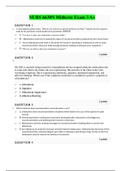
NURS 6630N Midterm Exam 3
NURS-6630C-8/NURS-6630N-8-Approaches to Treatment 2020 1. A patient is prescribed fluoxetine but is concerned about the side effects. Which statement demonstrates accurate patient teaching when discussing the side effects associated with fluoxetine? 2. A patient recently transferred following a suicide attempt has a history of schizophrenia, depression, and fibromyalgia. He is currently taking Amitriptyline (Elavil), Lisinopril, aspirin, and fluoxetine (Prozac). When assessing the psychiat...
- Exam (elaborations)
- • 34 pages •
NURS-6630C-8/NURS-6630N-8-Approaches to Treatment 2020 1. A patient is prescribed fluoxetine but is concerned about the side effects. Which statement demonstrates accurate patient teaching when discussing the side effects associated with fluoxetine? 2. A patient recently transferred following a suicide attempt has a history of schizophrenia, depression, and fibromyalgia. He is currently taking Amitriptyline (Elavil), Lisinopril, aspirin, and fluoxetine (Prozac). When assessing the psychiat...
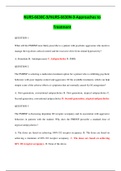
NURS-6630C-9/NURS-6630N-9-Approaches to Treatment
NURS-6630C-9/NURS-6630N-9-Approaches to Treatment 1. Parents of a 12-year-old boy want to consider attention deficit hyperactivity disorder (ADHD) medication for their son. Which medication would the PMHNP start? 2. A patient with hypersexual disorder is being assessed for possible pharmacologic treatment. Why does the PMHNP prescribe an antiandrogen for this patient? 3. Sandra complains of constipation after being on quetiapine (SEROQUEL) for several weeks. Constipation is likely caused ...
- Exam (elaborations)
- • 26 pages •
NURS-6630C-9/NURS-6630N-9-Approaches to Treatment 1. Parents of a 12-year-old boy want to consider attention deficit hyperactivity disorder (ADHD) medication for their son. Which medication would the PMHNP start? 2. A patient with hypersexual disorder is being assessed for possible pharmacologic treatment. Why does the PMHNP prescribe an antiandrogen for this patient? 3. Sandra complains of constipation after being on quetiapine (SEROQUEL) for several weeks. Constipation is likely caused ...

NURS-6630C-6/NURS-6630N-6-Approaches to Treatment
NURS-6630C-6/NURS-6630N-6-Approaches to Treatment Week 11 Final Exam 1. A 75-year-old male patient diagnosed with Alzheimer’s disease presents with agitation and aggressive behavior. The PMHNP determines which of the following to be the best treatment option? 2. All drugs that lead to addiction increase __________________in the ventral striatum, which is also called the _______________. 3. The PMHNP is attempting to treat a patient’s chronic pain by having the agent bind the ope...
- Exam (elaborations)
- • 16 pages •
NURS-6630C-6/NURS-6630N-6-Approaches to Treatment Week 11 Final Exam 1. A 75-year-old male patient diagnosed with Alzheimer’s disease presents with agitation and aggressive behavior. The PMHNP determines which of the following to be the best treatment option? 2. All drugs that lead to addiction increase __________________in the ventral striatum, which is also called the _______________. 3. The PMHNP is attempting to treat a patient’s chronic pain by having the agent bind the ope...
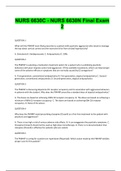
NURS 6630C - NURS 6630N Final Exam 2 A+
1. Brandon is a non-compliant patient that presents to the clinic asking for help with his alcohol dependence. The PMHNP evaluates the patient and determines a long-acting injection that blocks the mu-receptors would be the best treatment option for Brandon. Which medication should the PMHNP prescribe? 2. Sandra complains of constipation after being on quetiapine (SEROQUEL) for several weeks. Constipation is likely caused by the binding of quetiapine (SEROQUEL) to which receptor? 3. Even t...
- Exam (elaborations)
- • 54 pages •
1. Brandon is a non-compliant patient that presents to the clinic asking for help with his alcohol dependence. The PMHNP evaluates the patient and determines a long-acting injection that blocks the mu-receptors would be the best treatment option for Brandon. Which medication should the PMHNP prescribe? 2. Sandra complains of constipation after being on quetiapine (SEROQUEL) for several weeks. Constipation is likely caused by the binding of quetiapine (SEROQUEL) to which receptor? 3. Even t...
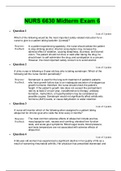
NURS 6630 Midterm Exam Pharm 6 A+
NURS 6630 Midterm Exam Pharm Week 6 1. A male patient is to begin glyburide (Diabeta) for type 2 diabetes. Before the drug therapy begins, a priority action by the nurse will be to assess the patient's 2. The nurse should assess the patient's alcohol consumption before therapy is initiated. Concomitant alcohol use increases the rate of glyburide metabolism and may cause a disulfiram-like reaction. Even though the patient's blood pressure should be assessed, it is not as important as mak...
- Exam (elaborations)
- • 10 pages •
NURS 6630 Midterm Exam Pharm Week 6 1. A male patient is to begin glyburide (Diabeta) for type 2 diabetes. Before the drug therapy begins, a priority action by the nurse will be to assess the patient's 2. The nurse should assess the patient's alcohol consumption before therapy is initiated. Concomitant alcohol use increases the rate of glyburide metabolism and may cause a disulfiram-like reaction. Even though the patient's blood pressure should be assessed, it is not as important as mak...
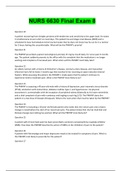
NURS 6630 Final Exam 8 A+
NURS 6630 Final Exam with Answers 1. Mrs. Rosen is a 49-year-old patient who is experiencing fibro-fog. What does the PMHNP prescribe for Mrs. Rosen to improve this condition? 2. An elderly woman with a history of Alzheimer’s disease, coronary artery disease, and myocardial infarction had a fall at home 3 months ago that resulted in her receiving an open reduction internal fixation. While assessing this patient, the PMHNP is made aware that the patient continues to experience mild to mod...
- Exam (elaborations)
- • 5 pages •
NURS 6630 Final Exam with Answers 1. Mrs. Rosen is a 49-year-old patient who is experiencing fibro-fog. What does the PMHNP prescribe for Mrs. Rosen to improve this condition? 2. An elderly woman with a history of Alzheimer’s disease, coronary artery disease, and myocardial infarction had a fall at home 3 months ago that resulted in her receiving an open reduction internal fixation. While assessing this patient, the PMHNP is made aware that the patient continues to experience mild to mod...
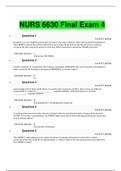
NURS 6630 Final Exam 4 A+
NURS 6630 Final Exam - Question and Answers (75 out of 75 Points) 1. Why does the PMHNP avoid prescribing clozapine (Clozaril) as a first-line treatment to the patient with psychosis and aggression? 2. A 75-year-old male patient diagnosed with Alzheimer’s disease presents with agitation and aggressive behavior. The PMHNP determines which of the following to be the best treatment option? 3. A group of nursing students seeks further clarification from the PMHNP on how cholinesterase inh...
- Exam (elaborations)
- • 14 pages •
NURS 6630 Final Exam - Question and Answers (75 out of 75 Points) 1. Why does the PMHNP avoid prescribing clozapine (Clozaril) as a first-line treatment to the patient with psychosis and aggression? 2. A 75-year-old male patient diagnosed with Alzheimer’s disease presents with agitation and aggressive behavior. The PMHNP determines which of the following to be the best treatment option? 3. A group of nursing students seeks further clarification from the PMHNP on how cholinesterase inh...
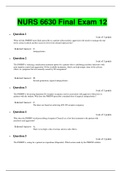
NURS 6630 Final Exam 12 A+ SUCCESS
NURS6630 Final Exam: Walden University 1. The parents of a 7-year-old patient with ADHD are concerned about the effects of stimulants on their child. The parents prefer to start pharmacological treatment with a non-stimulant. Which medication will the PMHNP will most likely prescribe? 2. The PMHNP is meeting with the parents of an 8-year-old patient who is receiving an initial prescription for D-amphetamine. The PMHNP demonstrates appropriate prescribing practices when she prescribes the f...
- Exam (elaborations)
- • 17 pages •
NURS6630 Final Exam: Walden University 1. The parents of a 7-year-old patient with ADHD are concerned about the effects of stimulants on their child. The parents prefer to start pharmacological treatment with a non-stimulant. Which medication will the PMHNP will most likely prescribe? 2. The PMHNP is meeting with the parents of an 8-year-old patient who is receiving an initial prescription for D-amphetamine. The PMHNP demonstrates appropriate prescribing practices when she prescribes the f...
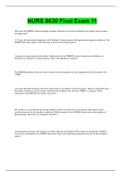
NURS 6630 Final Exam 11A+
NURS 6630 Final Exam with Answers 1. Why does the PMHNP avoid prescribing clozapine (Clozaril) as a first-line treatment to the patient with psychosis and aggression? 2. A 75-year-old male patient diagnosed with Alzheimer’s disease presents with agitation and aggressive behavior. The PMHNP determines which of the following to be the best treatment option? 3. A group of nursing students seeks further clarification from the PMHNP on how cholinesterase inhibitors are beneficial for Alzhe...
- Exam (elaborations)
- • 11 pages •
NURS 6630 Final Exam with Answers 1. Why does the PMHNP avoid prescribing clozapine (Clozaril) as a first-line treatment to the patient with psychosis and aggression? 2. A 75-year-old male patient diagnosed with Alzheimer’s disease presents with agitation and aggressive behavior. The PMHNP determines which of the following to be the best treatment option? 3. A group of nursing students seeks further clarification from the PMHNP on how cholinesterase inhibitors are beneficial for Alzhe...
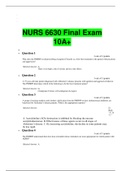
NURS 6630 Final Exam 10A+
NURS 6630 Final Exam (75/75 Points) The PMHNP is caring for a patient with fibromyalgia. Which second-line treatment does the PMHNP select that may be effective for managing this patient’s pain? The PMHNP is working with the student to care for a patient with diabetic peripheral neuropathic pain. The student asks the PMHNP why SSRIs are not consistently useful in treating this particular patient’s pain. What is the best response by the PMHNP? A patient is being prescribed bupropion and ...
- Exam (elaborations)
- • 17 pages •
NURS 6630 Final Exam (75/75 Points) The PMHNP is caring for a patient with fibromyalgia. Which second-line treatment does the PMHNP select that may be effective for managing this patient’s pain? The PMHNP is working with the student to care for a patient with diabetic peripheral neuropathic pain. The student asks the PMHNP why SSRIs are not consistently useful in treating this particular patient’s pain. What is the best response by the PMHNP? A patient is being prescribed bupropion and ...

NURS 6531N Final Exam 4 with Answers
NSG 6005 Final Exam 2
NURS 6531N Final Exam 3 A+
NR 602 Week 8 Final Exam Solved